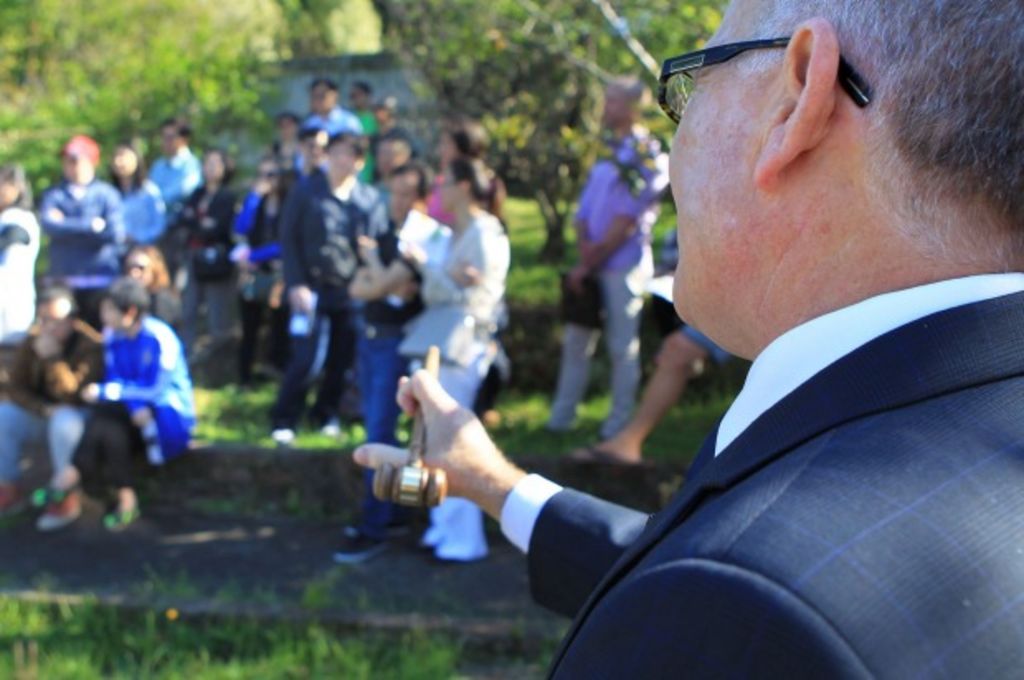The 10 most common strategies at property auctions. . . and whether they work

Death, divorce, public speaking and … bidding for a property at an auction. There’s little more terrifying in life.
With online auction bidding set to come in next year – with you watching safely from home on a computer screen and keying in your bids – it might not be so scary in future.
But for now, our four top experts give their verdicts on some of our most common auction strategies.
1. Hide behind a post, or at the back of the room during the auction
Does it Work? No.
“It’s much better to take a position in the middle of the room where everyone can see you,” says Scott Smith, chief auctioneer of Ray White NSW. “Looking determined, with strong body language is then very important; with decisive movements and everything about you saying, ‘I’m not going to be beaten!’ I’ve seen a lot of people missing out at auctions, time and time again, hiding away at the back.”
2. Never make the first bid
Does it Work? Not really.
“A lot of people tend to do this but I think you might as well bid first,” says Graeme Hennessy, chief auctioneer of the independent Premier Property Auctions. “It’s not going to cost you anything, as you’ll rarely buy a property on a first bid. But if you’re there, starting the process, then experience shows us you’ll have a better chance of still being there at the end.”

Those who make the first bid are more likely to be bidding at the end. Photo: James Brickwood JSB
3. Come in with a strong bid early, and knock everyone else out of the park
Does it Work? Yes, sometimes.
“A lot of people try this, especially if they know they really want the property and have a good idea of what it’s worth,” says Graeme Hennessy. “This can prove a very effective strategy as it often takes the competition by surprise.”
4. Work off your own instincts on auction day
Does it Work? No.
“It’s important to take notice of your agent’s advice and recommendations throughout the auction campaign, says McGrath chief auctioneer Scott Kennedy-Green. “On auction day, that’s even more important. Give careful consideration to what the agent recommends particularly about the reserve price on the day.”
5. Ask, in the middle of an auction, ‘Is this property on the market yet?’
Does it Work? No.
“I think this is a weak strategy,” says Damien Cooley of Cooley Auctioneers. “The owner tends to remember who asked, and feels it’s a crack at them, and sees that buyer as being difficult. And if the property is passed in, they might not want to negotiate with that buyer. It’s only a courtesy that they meet the highest bidder; not law.”

Let your bidding do the talking at
auction
Photo
: Chris Hopkins
6. Hold back throughout the bidding
Does it Work? No.
“The earlier you enter the bidding, the more seriously you’re viewed by your competitors,” says Scott Smith. “Psychologically, it’s powerful being seen early and often. At an auction in Freshwater two weeks ago, the second bidder was there the whole time, bidding until the others gave up.”
7. Stay silent, then come in right at the end with a killer bid
Does it Work? Rarely.
“The challenge with that is, if an owners seen lots of competitive bidding, then they’re more likely to put the property on the market, meet the top price and sell,” says Damien Cooley. “If there hasn’t been much bidding, they’ll probably pass it in. And then, an owner is much more inclined to negotiate with someone they’ve seen bidding.”
8. As soon as someone bids against you, bid again immediately
Does it Work? Yes.
“You don’t wait even five or ten seconds, but go straight in with your counter-bid,” Graeme Hennessy says. “It always gives the other bidder the impressions that you’re going to keep going and going and going, and won’t give up. I’ve spoken to the losing bidders afterwards who’ve said the winner who used that ploy made them think they just wouldn’t stop bidding until it was theirs, so they gave up earlier than they might have otherwise.”

Asking someone else to bid on your behalf can pay off. Photo: Dominic Lorrimer
9. Getting a professional to bid for you.
Does it Work? Yes, sometimes.
“If you’re in the room, you’re the one who has to bid as it’ll be your name as the registered bidder and your name on the contract,” says Scott Smith. “But you can nominate someone else if you’re going to be away, at the end of the phone line. That can work well and it means you’re out of the emotion of the auction room, and won’t get carried away by the moment.”
10. Make it clear you’d like a longer settlement, to give the vendor plenty of time to get out
Does it Work? No, especially not now.
“Vendors mostly want to settle before Christmas, so they don’t have to pay land tax,” says Damien Cooley.
We recommend
States
Capital Cities
Capital Cities - Rentals
Popular Areas
Allhomes
More







